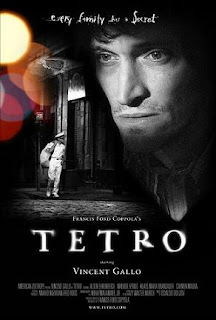Tetro
 Perhaps rejuvenated by Youth Without Youth, which was about an older man who reclaims his youth after being hit by lightning, Francis Coppola seems to have his mojo back. I say this after seeing his most recent film, the assured and masterful Tetro. The old guy has still got it.
Perhaps rejuvenated by Youth Without Youth, which was about an older man who reclaims his youth after being hit by lightning, Francis Coppola seems to have his mojo back. I say this after seeing his most recent film, the assured and masterful Tetro. The old guy has still got it.Shot in silvery black and white by Mihai Malaimare Jr., Tetro returns to a familiar Coppola theme—brothers. In some sense, Coppola has explored this theme all the way back to The Godfather, with the complex relationships between Sonny, Michael, Fredo, and Tom, and then again in the films based on S.E. Hinton's books, The Outsiders and Rumble Fish. In fact, I was noting many thematic similarities between Rumble Fish and Tetro, perhaps most striking the parallels of performance between Mickey Rourke as Motorcycle Boy and Vincent Gallo as the title character, Tetro.
The film begins with a young man, Alden Ehrenreich, arriving in Buenos Aires. He has looked up his much older brother, whom he hasn't seen in several years. The brother's common-law wife (Maribel Verdu), welcomes Ehrenreich, but Gallo, wearing a cast on his leg, is less enthused. Over the course of the film we learn how Gallo became estranged from his family, most notably his dictatorial father (Klaus Maria Brandauer), a celebrated orchestra conductor. But Gallo warms to his brother's presence, even after Ehrenreich behaves like a little shit, most specifically rooting around in his brother's effects to find his long-aborted novel, which tells the story of his relationship with his father.
Gallo's presence is a big surprise, considering how self-indulgent some of his films have been. According to the "making of" featurette, Gallo doesn't believe in rehearsal, but did so anyway, in a nod of respect to Coppola. I have to believe this helped Gallo find some restraint in the character, a man tortured by his past. He holds the camera almost effortlessly, his character brimming with a kind of desperate genius. I came away wanting to see him in more films, just not directed by himself.
The film does break down toward the end, dropping a big family secret on us like an Acme anvil. Ehrenreich is like a baby DiCaprio, but without the latter's charm, and several times I wanted him gone from the film. But the film looks great. The black and white photography is dreamy, as is the brief forays into over-saturated color, a nod to Michael Powell in some scenes of the ballet "Coppelia." It seems that Gallo took Ehrenreich to see The Red Shoes when they were young.
It's been a great few years for directors of later years, and there's no reason why Coppola, if he's interested, should keep making them. Judging by Tetro, he has a lot left to say.


Comments
Post a Comment